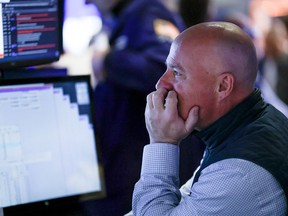Article content
U.S. stocks tumbled Friday, on pace for losses in six of the past seven weeks as strong labour data did little to mitigate anxiety about the impact of a trade war on the domestic economy.
Written by Bloomberg News on . Posted in Canada.
‘The market is giving big thumbs down to this tariff policy’
Author of the article:
Bloomberg News
Jessica Menton
Published Apr 04, 2025 • Last updated 47 minutes ago • 3 minute read

U.S. stocks tumbled Friday, on pace for losses in six of the past seven weeks as strong labour data did little to mitigate anxiety about the impact of a trade war on the domestic economy.
Article content
Article content
The S&P 500 Index sank 2.4 per cent as of 9:31 a.m. in New York, after declining as much as 4.1 per cent premarket.
The Nasdaq 100 Index plunged another 2.6 per cent, teetering almost 20 per cent below its February record in a rout whose swiftness is rivalled only by the pandemic meltdown in 2020 and 2000’s dot-com implosion.
Advertisement 2
Story continues below
This advertisement has not loaded yet, but your article continues below.
THIS CONTENT IS RESERVED FOR SUBSCRIBERS ONLY
Subscribe now to read the latest news in your city and across Canada.
SUBSCRIBE TO UNLOCK MORE ARTICLES
Subscribe now to read the latest news in your city and across Canada.
REGISTER / SIGN IN TO UNLOCK MORE ARTICLES
Create an account or sign in to continue with your reading experience.
THIS ARTICLE IS FREE TO READ REGISTER TO UNLOCK.
Create an account or sign in to continue with your reading experience.
or
Article content
Canada’s TSX dropped 833 points by mid-morning.
Technology megacaps including Nvidia Corp., Tesla Inc. and Apple Inc. all fell. U.S.-listed Chinese stocks like Alibaba and Baidu also slumped. The SPDR S&P Bank ETF dropped 4 per cent, with Morgan Stanley leading the declines.
The rout came as China imposed a 34 per cent tariff on all American imports starting April 10, in addition to targeted actions against poultry producers and weapons makers, according to the official Xinhua News Agency. The latest salvo in Donald Trump’s trade war added to volatility that’s been gripping global financial markets since the president announced the harshest tariffs in a century. Trump, for his part, appears to be sticking to his guns, saying his economic policies “will never change.”
Article content
The Cboe Volatility Index soared near 40 — levels associated with some of the worst market turbulence in recent memory. Treasuries continued to soar as investors sought safety, while a measure of credit risk spiked to the highest level since the regional banking crisis in March 2023.
U.S. job growth beat forecasts in March and the unemployment rate edged up, pointing to a healthy labour market before the economy gets hit by widespread tariffs. This was the first major piece of data for the quarter — which could have wide-ranging implications for bond, stock and currency markets as well as the Fed’s next moves.
Investor
Canada’s best source for investing news, analysis and insight.
By signing up you consent to receive the above newsletter from Postmedia Network Inc.
Thanks for signing up!
A welcome email is on its way. If you don’t see it, please check your junk folder.
The next issue of Investor will soon be in your inbox.
We encountered an issue signing you up. Please try again
Article content
Advertisement 3
Story continues below
This advertisement has not loaded yet, but your article continues below.
Article content
“A good jobs report won’t be enough to quell recession fears because it’s backward-looking and won’t full give insight into how hard the economy will take a hit from the trade war,” said Scott Ladner, chief investment officer at Horizon Investments.
Now, traders are boosting their expectations for the Federal Reserve to cut interest rates this year. Money markets are fully pricing four quarter-point reductions by year-end, with a more than 50 per cent chance of a fifth — up from just three cuts priced in before the levies were announced. That pushed US 10-year yields below 3.90 per cent, the lowest since before election day, while oil tumbled to the lowest in four years.
The S&P 500 is down 14 per cent from its February record and on track for a sixth week of losses in the past seven. Fund managers yanked US$4.7 billion out of U.S. stocks in the week through April 2 in the second week of outflows, data compiled by EPFR Global and Bank of America show.
“The market is bleeding and more pain is clearly coming as this escalating trade war risks pushing the U.S. economy into a recession,” Luca Paolini, chief strategist at Pictet Asset Management said over the phone. “It’s not a surprise China would retaliate. But this will inevitably cause a recession because the damage is done — unless Trump backs off.”
Advertisement 4
Story continues below
This advertisement has not loaded yet, but your article continues below.
Article content
Friday’s losses follow a massive wipe out by U.S. stocks on Thursday that erased US$2.5 trillion in value in the wake of President Donald Trump’s drastic new trade tariffs, which ignited widespread recession fears.
Trump on Wednesday imposed the steepest American tariffs in a century, saying he will apply a 10 per cent tariff on all exports to the U.S., with even higher duties on some 60 nations, to counter large trade imbalances with the U.S.
Recommended from Editorial
“How bad will it get for the economy? With so much uncertainty swirling, stocks are selling off and that’s signalling that investors see both economic and profit growth slowing because of the trade war,” said Adam Sarhan, founder of 50 Park Investments.
Article content
Share this article in your social network
Featured Local Savings
Comments